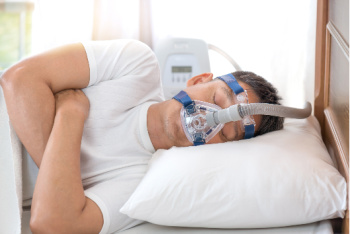Taking Testosterone? Watch for Polycythemia and Sleep Apnea, Experts Warn

Men undergoing testosterone replacement therapy (TRT) should be aware of links between obstructive sleep apnea (OSA) and polycythemia, an abnormal amount of circulating red blood cells in the bloodstream, suggests a recent Journal of Sexual Medicine study.
TRT has grown in popularity over the years. It is generally approved for men whose bodies don’t produce enough testosterone on their own due to problems in the testes (the glands that make the hormone) or areas of the brain that trigger testosterone production.
However, men’s testosterone levels gradually decline as they get older, too. Some take testosterone to manage symptoms like low libido, moodiness, and fatigue.
TRT does have side effects. One is polycythemia (also called erythrocytosis). As the number of red blood cells grows, the blood can thicken, increasing the risk for stroke. Usually, men who develop polycythemia can lower their testosterone dose or switch to a different formulation.
Polycythemia is also associated with obstructive sleep apnea, a disorder that causes a person to stop breathing for short intervals while asleep. Studies have found that men with low testosterone, and those on TRT, might be more likely to have OSA.
The authors of the current study wanted to learn more about the relationship among TRT, polycythemia, and OSA.
They analyzed the medical charts of 474 men in their clinic who were on TRT. About 13% of the men were diagnosed with polycythemia. Of this group, 52% were also diagnosed with OSA.
There was a “strong positive association” between polycythemia and an OSA diagnosis in these men, the researchers said.
They further studied the subgroup of men with both polycythemia and OSA. All of the men were prescribed CPAP (continuous positive airway pressure) for their sleep apnea, although about half did not comply with their instructions. As for polycythemia, some of the men were treated with phlebotomy (blood draws to reduce blood volume) and some had their TRT dose lowered.
The researchers found that in this subgroup, body mass index (BMI) was “the only risk factor strongly associated with OSA.”
Men on TRT, especially those with a higher BMI, should be screened for OSA if they develop polycythemia, the authors concluded.
Men whose OSA is undiagnosed or poorly treated could be at higher risk for cardiovascular problems later on. But proper OSA treatment could have cardiovascular benefits in these men, they added.
Resources
Healthline.com
Hecht, Marjorie
“Secondary Polycythemia (Secondary Erythrocytosis)”
(February 8, 2019)
https://www.healthline.com/health/secondary-polycythemia
Lights, Verneda
“Obstructive Sleep Apnea”
(Updated: March 31, 2017)
https://www.healthline.com/health/sleep/obstructive-sleep-apnea
The Journal of Sexual Medicine
Lundy, Scott D., MD, PhD, et al.
“Obstructive Sleep Apnea Is Associated With Polycythemia in Hypogonadal Men on Testosterone Replacement Therapy”
(Full-text. Published: April 16, 2020)
https://www.jsm.jsexmed.org/article/S1743-6095(20)30169-7/fulltext
You may also be interested in...
Other Popular Articles

What Is the Average Penis Size?
If you have ever wondered how your penis compares to others in terms of size, you are not alone. Many men are curious to know how their penises stack up compared to the average. Unfortunately, general curiosity can sometimes give way to full-on obsession and anxiety about penis size. This can be an unhealthy and often unnecessary fixation, especially because most men who think their penises are too small have perfectly normal-sized penises.

What Is Jelqing, and Does It Actually Work?
The term “jelqing” refers to a set of penis stretching exercises that some believe can make the penis bigger. Although the practice has gained attention and popularity in blogs and internet forums in recent years, there is no scientific evidence that it is an effective way to permanently increase the size of one’s penis. In fact, in some cases, jelqing may actually cause damage to the penis, so it is a good idea to get all the facts before setting off to try it.

What Is Sensate Focus and How Does It Work?
Sensate focus is a technique used to improve intimacy and communication between partners around sex, reduce sexual performance anxiety, and shift away from ingrained, goal-oriented sexual patterns that may not be serving a couple.

Can Sex Reduce Menstrual Cramps?
The SMSNA periodically receives and publishes ‘guest editorials.’ The current article was submitted by Mia Barnes, a freelance writer and researcher who specializes in women's health, wellness, and healthy living. She is the Founder and Editor-in-Chief of Body+Mind Magazine.
Having sex while you experience menstrual cramps is healthy and can provide significant benefits. While it might not be the first activity that comes to mind when your PMS or period cramping begins, many people enjoy sex to reduce menstrual cramps, experience increased pleasure and benefit from other advantages. Learn more about having sex while menstrual cramps are happening and how it can help your body.

How Long Does It Take the Average Man to Ejaculate?
On average, it takes a man between 5 to 7 minutes to orgasm and ejaculate during sexual intercourse.

Can Sex Throw off Your Vaginal pH Balance?
The SMSNA periodically receives and publishes ‘guest editorials.’ The current article was submitted by Mia Barnes, a freelance writer and researcher who specializes in women's health, wellness, and healthy living. She is the Founder and Editor-in-Chief of Body+Mind Magazine.
Your vagina is a pretty powerful organ. It is a pathway for menstrual blood and babies. It also is a main player in sexual intercourse. You might hear about your vagina’s pH and worry that yours is at risk. Here’s what to know about vaginal pH, including the impacts sex could have.
You are prohibited from using or uploading content you accessed through this website into external applications, bots, software, or websites, including those using artificial intelligence technologies and infrastructure, including deep learning, machine learning and large language models and generative AI.

